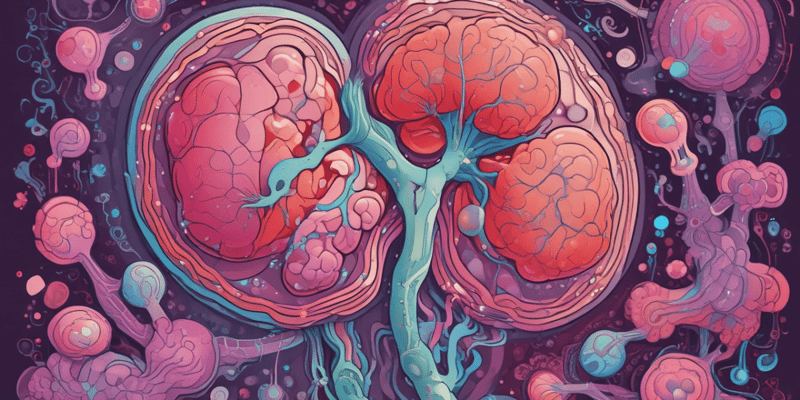Podcast Beta
Questions and Answers
Which factor is NOT considered a risk factor for Acute Glomerulonephritis?
What is a primary clinical manifestation of Acute Glomerulonephritis?
Which of the following is a common nursing intervention for patients with Acute Glomerulonephritis?
What key component is part of the medical management for diagnosing Acute Glomerulonephritis?
Signup and view all the answers
Which statement about the pathophysiology of Acute Glomerulonephritis is true?
Signup and view all the answers
What are potential complications associated with Acute Glomerulonephritis?
Signup and view all the answers
Which nursing intervention is crucial for monitoring a patient with Acute Glomerulonephritis?
Signup and view all the answers
What dietary modification is recommended for patients diagnosed with Acute Glomerulonephritis?
Signup and view all the answers
Which of the following symptoms would be indicative of Acute Glomerulonephritis?
Signup and view all the answers
What primary aspect affects the prognosis of Acute Glomerulonephritis?
Signup and view all the answers
Study Notes
Acute Glomerulonephritis
- Prognosis depends on the cause and severity of the condition.
- Risk factors include infections, immune diseases, vasculitis, hypertension, diabetes.
- Glomeruli within Bowman's capsule of the kidney become inflamed.
- Inflammation is triggered by an immunological process.
- Urine may contain protein, blood, white blood cells (WBCs), and casts.
- Edema, decreased urine output, hypertension, and elevated blood urea nitrogen (BUN) and creatinine levels are possible.
- Medical management includes taking a medical history, physical exam, and laboratory tests.
- Treatment involves medications, supportive care, plasmapheresis, and rest.
- Complications include renal failure.
- Nursing assessment focuses on clinical manifestations resulting from damage to Bowman's capsule.
- Relevant nursing diagnoses include impaired urinary elimination and ineffective therapeutic regimen management.
- Nursing interventions involve monitoring vital signs, daily weights, intake and output, abdominal girth, skin condition, dietary intake, and laboratory analysis.
- Nursing actions include administering medications as ordered, maintaining a low-to-moderate protein diet, and restricting dietary sodium and fluids.
- Nursing teaching includes explaining the disease process, prescribed medications, dietary restrictions, preventing infections, and handwashing.
- Evaluating care outcomes includes blood pressure within normal limits, absence of edema, and renal function within normal limits.
Epidemiology
- Prognosis of acute glomerulonephritis varies depending on the cause of the infection and the severity of the damage.
Risk Factors
- Infections
- Immune diseases
- Vasculitis
- Hypertension
- Diabetes
Pathophysiology
- Inflammation of the glomeruli within Bowman's capsule of the kidney.
- Triggered by an immunological mechanism.
Clinical Manifestations
- Protein, blood, white blood cells, and casts in the urine.
- Edema
- Decreased urine output
- Hypertension
- Elevated blood urea nitrogen (BUN) and creatinine levels
Medical Management: Diagnosis
- Medical history
- Physical examination
- Laboratory tests
Medical Management: Treatment
- Medications
- Supportive care
- Plasmapheresis
- Rest
Complications
- Renal failure
Nursing Management: Assessment and Analysis
- Assess for clinical manifestations of damage to Bowman's capsule.
Nursing Management: Nursing Diagnoses
- Impaired urinary elimination
- Ineffective therapeutic regimen management
Nursing Interventions: Assessments
- Vital signs
- Daily weights
- Intake and output
- Measure abdominal girth
- Skin condition
- Monitor dietary intake
- Laboratory analysis
Nursing Interventions: Actions
- Administer medications as ordered
- Maintain a low-to-moderate protein diet.
- Dietary sodium and fluid restriction.
Nursing Interventions: Teaching
- Provide an overview of the disease process.
- Explain prescribed medications.
- Discuss dietary restrictions
- Emphasize the importance of avoiding infections
- Encourage frequent hand washing.
Nursing Management: Evaluating Care Outcomes
- Blood pressure within normal limits.
- No edema.
- Renal function within normal limits.
Studying That Suits You
Use AI to generate personalized quizzes and flashcards to suit your learning preferences.
Description
This quiz covers the key aspects of Acute Glomerulonephritis, including its causes, risk factors, clinical manifestations, and treatment options. It also addresses the nursing assessment and interventions for managing this condition. Test your knowledge on this important topic in renal health.




